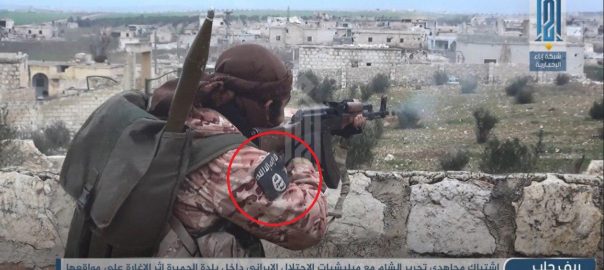The New York Times continues its lengthy tradition of covering the story of Idlib as if it were one only of a humanitarian crisis brought about by the Syrian government (which they call a “regime”), and its allies. In yet another lengthy, expensive, lavishly illustrated story about Idlib, the NYT once again failed to make any mention of the politics of what is happening in that enclave of northwestern Syria– namely, the fact that well-armed jihadist/takfiri fighters from all around the world have controlled it for the past several years, while Syria’s government forces have been battling to regain control.
In that latest article, as in all of the lengthy, one-sided tearjerkers it has published about Idlib over the past year, the NYT has no actual journalists or photographers on the ground reporting the story. It is wholly reliant instead on “stories” and footage it gathers from unverifiable sources inside the enclave– sources who notably never include any mention of the jihadi armed groups that control all aspects of life there.
For those who want to understand the politics of the situation in Idlib, I heartily recommend this well-informed article by Turkish journalist Fehim Tastekin. Turkey, of course, is a key actor regarding Idlib since it totally controls all passage of people, arms, and other goods in and and out of the enclave.
Tastekin writes this about Hayat Tahrir al-Sham (HTS), the jihadi group that exerts the greatest amount of control within Idlib:
Hayat Tahrir al-Sham has lost nothing of its jihadi core that seeks a state based on Sharia law. Moreover, since the Sochi deal between Turkey and Russia, Hayat Tahrir al-Sham has come to control 90% of Idlib, displacing factions that Ankara had incorporated into the Astana process. The group will not lose its jihadi character even if it rebrands itself again… Even some of the groups treated as more reasonable because of Turkey’s support have adopted the Islamic State flag as a symbol on their arm badges.
(See the photo above of an IS-flag-wearing fighter operating in the Idlib enclave. It is taken from the HTS-supporting Ebaa News website.)
In related news, the UN’s Under-Secretary for Humanitarian Affairs and Emergency Relief, Mark Lowcock, today issued a statement noting that,
The crisis in northwest Syria has reached a horrifying new level.
We now believe 900,000 people have been displaced since 1 December, the vast majority women and children.
Some news outlets have exaggerated what Lowcock said, quoting him as describing the humanitarian crisis in Idlib as the “biggest humanitarian horror story of the 21st Century.” However, here is what he actually said:
The biggest humanitarian horror story of the 21st Century will only be avoided if Security Council members, and those with influence, overcome individual interests and put a collective stake in humanity first. The only option is a ceasefire.
His call for a ceasefire is notable; and it is certainly to be hoped that all the governments with influence regarding the Idlib situation–that is, Syria, Turkey, and Russia– can speedily conclude such a ceasefire. The issue of what to do about HTS and other takfiri/jihadis who still remain in control in the enclave will, however, have to addressed head-on. Under the Sochi agreement that those three governments concluded in September 2018, Turkey undertook to disarm and demobilize the jihadis in Idlib. It has not done so. Instead, until now, it has continued to arm and support them.
Fehim Tastekin’s article (all of which is well worth reading) indicates there is a possibility Ankara might now move against the takfiris. Let us hope so!
